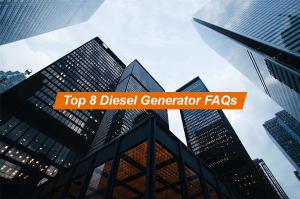Top 8 Diesel Generator FAQS
 Diesel generators have become a common necessity for companies and households in Australia today. With so many applications that depend on continuous power supply, diesel generators have become a default solution and insurance policy. This is because of the comfort, security, and productivity they can guarantee, especially during emergencies. However, buying a diesel generator can be overwhelming. You need to pull out resources for this significant purchase and make sure you choose units suitable for your needs. And, if you don’t know much about diesel generators, getting one will be even more challenging. To help you make the right decision for this important investment, below are the top 8 diesel generator FAQs.
Diesel generators have become a common necessity for companies and households in Australia today. With so many applications that depend on continuous power supply, diesel generators have become a default solution and insurance policy. This is because of the comfort, security, and productivity they can guarantee, especially during emergencies. However, buying a diesel generator can be overwhelming. You need to pull out resources for this significant purchase and make sure you choose units suitable for your needs. And, if you don’t know much about diesel generators, getting one will be even more challenging. To help you make the right decision for this important investment, below are the top 8 diesel generator FAQs.
1. What is a diesel generator?
The first and most obvious question most frequently asked is, what is a diesel generator? Simply put diesel generator as a device that runs on diesel fuel used for locally producing electrical energy in residential or business properties. In Australia, diesel generators backup power supply when the usual power grid is unavailable.
2. How does a diesel generator work?
Diesel generators convert the chemical energy, contained in diesel fuel, to mechanical energy through combustion. This mechanical energy then rotates a crank that produces electricity. Electric charges are produced in the wire by transporting it through a magnetic field. It does all this by using a diesel engine and an AC alternator.
3. How are generators sized?

Size matters when choosing a diesel generator for sale. Sizing generators depends on the power requirements of the site. Some generators can power an entire site while others can only provide backup for a few essential loads. Another thing to consider is the type of load that will be applied to the unit. UPS loads could have some harmonic content which requires the generator to be sized to cope with this type of load. Motors and pumps could also affect the performance of the generator upon starting. Moreover, the nature of the engine is also important in sizing a generator. Some turbocharged engines have low initial load step capability so you might need to oversize the unit.
4. What is the difference between kW and kVA?
Generators are sized using both the kW (kilowatt) and kVA (kilovolt-ampere) units of measurement. The main difference between kW and kVA is the power factor. A kW is the unit of real power or the measurement of the actual power that can be drawn from a circuit. On the other hand, a KVA is the maximum apparent power that the generator is designed to handle. It is simply 1,000-volt-amps, where volt is electrical pressure and amp is electrical current. The apparent power is equal to the product of the volts and amps. As waves of current and voltage coincide less, transferred real power is less, even if the circuit is still carrying current. Differences between real and apparent power arise because of inefficiencies in electrical transmission or the power factor. Understanding the impact of different loads is key in correctly sizing the generator.
5. What should be considered before installing the generator?
Diesel generators are bulky machines that require special attention. To choose one, you must consider the following:
- Space planning
Make sure there is sufficient space in your facility to accommodate your generator. You may choose to place your generator inside the building for easy access and to prevent theft. Or, place it outside to lessen disturbances and save space in your facility.
- Foundations / floor loading
Installing generators on a strong and level surface is a must since they are heavy. Concrete platforms are ideal for external applications.
- Exhaust
Diesel engines tend to produce a lot of smoke, especially during initial start-up. Installing an exhaust stack or flue routed outdoors lessens the smoke.
6. How much fuel does an average diesel generator consume and how is it stored?
The fuel efficiency of a diesel generator will depend on its engine. However, as a general guide, a modern engine will consume around 210 litres per hour per 1000kVA. You can find your generator’s consumption figures in its manual or datasheet.
Diesel generators have internal fuel tanks that allow them to run for around 6 to 8 hours. To extend its running time, you can buy additional bulk storage tanks. Just be sure your fuel storage system does not go against fuel storage regulations in your area.
7. Can a generator’s noise be reduced?
Installing diesel generators within a building structure produces significant noise. However, proper ventilation can allow noise to escape from the combustion air. Proper placement of the unit will also help to ensure that your diesel generator will operate correctly and produce acceptable noise levels. Acoustic container absorbs most of the noise from external units placed in it.
8. How often should a diesel generator be serviced?
A diesel generator will perform better and have a longer lifespan when fully serviced and maintained. The recommended frequencies of servicing for a diesel generator will depend on its usage and running time. As a rule of thumb, have your diesel generator assessed and serviced at least once every 6 months or at 400 hours running time.
After reading these Top 8 diesel generator FAQs, you should already have a better grasp of what they are all about. If you want to learn more or explore your options, call us at Genset Hire and Sales Australia. We’d gladly guide you through your search in finding Australia’s best diesel generator to match your needs. And, our experienced specialist can help answer any further questions you might have. Remember, the only silly questions are the ones you never ask. You shouldn’t have any questions or doubt left on your mind to avoid making a decision you might later regret.

